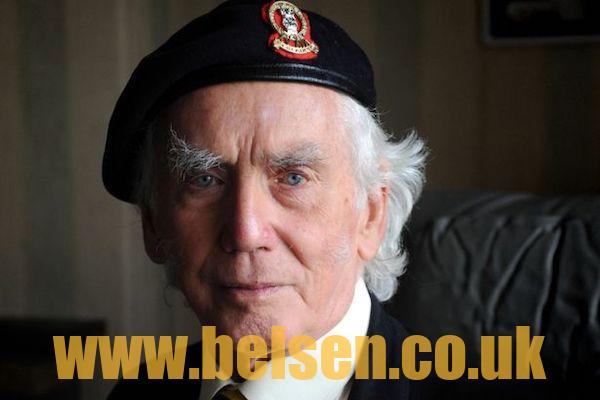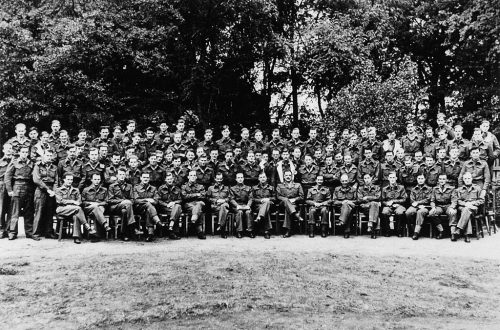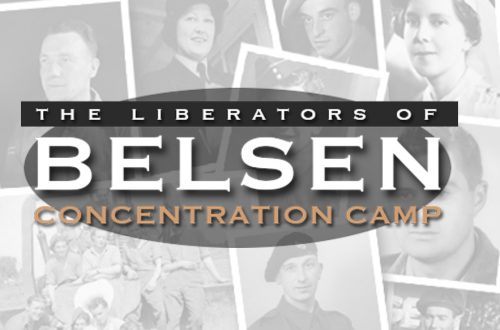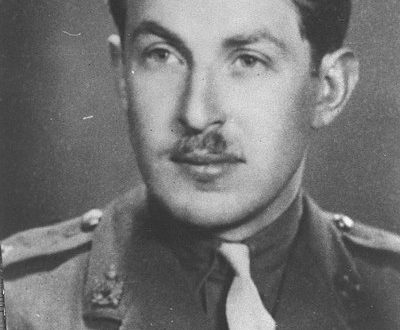Ian Forsyth, MBE. Points of Light
Ian Forsyth MBE, aged 96, from Lanarkshire, was one of the first British troops to liberate the Bergen-Belsen concentration camp in 1945 and has since dedicated his life to helping others through his work as a teacher and wider Holocaust education. 
Ian is believed to be one of the last surviving British liberator of the camp, having served as a wireless operator with the 15th/19th King’s Royal Hussars in the The Royal Armoured Corps at the age of 21, which arrived at the gates of Bergen Belsen on 15 April 1945. He has revisited the site many times since and shared his testimony from the day to help raise awareness and understanding of the Holocaust. Ian has also been an active member of ‘Legion Scotland’ and the Scottish veterans community following his days in the army, serving as president and secretary of the Hamilton branch for many years.
1586. Ian Forsyth
Ian’s award coincides with Holocaust Memorial Day, the annual day of remembrance for the millions of people murdered in the Holocaust and of subsequent acts of genocide in Cambodia, Rwanda, Bosnia and Darfur. Alongside Renee Salt, who survived Auschwitz and Belsen, Ian spoke with Prime Minister Boris Johnson on a virtual call to share his experiences.
In a personal letter to Ian, Prime Minister Boris Johnson said:
“Thank you so much for sharing your testimony with me in our call last week. Your memories of discovering the camp at Bergen Belsen and your harrowing description of all that you found there are some of the most powerful words I have ever heard.
“Every day I write to someone in our country to thank them for their service to others by naming them a Point of Light. As we mark Holocaust Memorial Day, allow me to express the admiration and gratitude of our nation for your life’s work by naming you as the UK’s 1586th Point of Light.”
15th/19th The King’s Royal Hussars landed on Gold Beach on 16 August 1944 eager to play their part in the liberation of Europe and believing their cause to be a just one. By spring 1945, this idealism had largely evaporated and had been replaced by a desperate day-to-day struggle for survival. Their progress through Northern Germany to the Baltic as part of 11th Armoured Division was dogged by fierce German resistance despite the increasing hopelessness of their situation.
A curious event occurred on 12 April as the Division approached the River Aller. The local German commander approached 11th Armoured Division under a white flag and sought a temporary ceasefire. He explained that a little further north was a camp containing thousands of political and criminal prisoners. He went on to say that there was an outbreak of typhus and if the prisoners were to break out there was danger of an epidemic. The officer said the camp was run by the SS and that the Wehrmacht (the German army) had known nothing about it. He offered the British commander safe passage across the Aller if the German forces were allowed to disengage and retreat north. As it transpired, the precise terms of this agreement could not be agreed upon, and in the subsequent action over the next couple of days the 15th/19th sustained a number of casualties.
Being oblivious to this incident, the regiment had no reason to expect that 15 April 1945 would be a day any different from those of the last few months; they made their preparations that morning, unaware of the scenes that they would see later that day, unimaginable scenes that would stay with them forever.
It became clear quite early that their recent routine of pushing forward through Northern Germany clearing up any enemy still fighting wasn’t happening that morning. The roads were unusually busy with traffic and pedestrians, some of the vehicles with white flags. And then there was the smell. The air seemed to have a peculiar smell, greasy, but more than that, which one couldn’t recognise. Eventually, the order came to move, with the added instructions that when they came to the camp they were not to open the camp gates, let anyone out, feed or touch anyone and, if that wasn’t enough to add to the men’s feelings of unease, leave the German guards on duty.
On approaching the camp, their apprehension increased; they could see the barbed wire, then the watch towers still manned by the German guards, and then the inmates. The soldiers stared speechless at the sight before them.
One of these soldiers was 21 year old Ian Forsyth. We are doubly fortunate in that not only is Ian still with us, but that he has committed his testimony to print. In this testimony, he does not actually describe the things that he saw that day in any great detail, and certainly I do not have adequate words to describe the horror. We have all seen the newsreels, and the words of Richard Dimbleby of the BBC are as appropriate as any I have heard:
‘…Here over an acre of ground lay dead and dying people. You could not see which was which… The living lay with their heads against the corpses and around them moved the awful, ghostly procession of emaciated, aimless people, with nothing to do and with no hope of life, unable to move out of your way, unable to look at the terrible sights around them … Babies had been born here, tiny wizened things that could not live … A mother, driven mad, screamed at a British sentry to give her milk for her child, and thrust the tiny mite into his arms, then ran off, crying terribly. He opened the bundle and found the baby had been dead for days. This day at Belsen was the most horrible of my life.’
What Ian Forsyth does do, with remarkable candid and moving clarity, is talk of the effect this day has had on him and his comrades. Despite orders to the contrary, someone threw some army rations over the wire. How could a human being stand by and do nothing? Those at the back surged forward and trampled on those at the front to get to the food. Those who got the food would almost certainly die anyway, their bodies unable to handle the food. It took the medical authorities some days to establish how best to nourish and feed the liberated prisoners.
The 15th/19th Hussars never entered Belsen. They were front line fighting troops and needed to press on. It was left to others in the following days to enter the camp and discover and deal with the full horror of what had taken place there. There was no time to come to terms with or seek counselling for the horror they had witnessed. That wasn’t the way things were done then anyway. One thing that Ian does say is this experience reminded them of the reason they were fighting this war, and a little of the old idealism returned.
The day after the liberation, the regiment were back on operations and Ian and his troop had good cause to regret the failure of the proposed cease-fire. Whilst on reconnaissance in a wood, a job Ian hated, a German column was spotted and orders were given to allow it to pass. A short while later an 88mm shell hit them, destroying one of their tanks and seriously wounding the crew, including the troop leader and a young Jewish front gunner who had come over to Britain on the Kindertransport just before the outbreak of the war and enlisted as soon as he could. At that time, particularly near the end of the war, soldiers could never be sure if their wounded comrades survived or not, as the wounded were evacuated and the surviving troops pressed on.
Ian Forsyth has had to find a way to live with his demons since then. He has done this by facing them and by telling others about them. Without going into detail, he indicates that some of his comrades have been less successful in their struggles with the past. He spent years as a teacher and has recounted his experiences to young and old. He has been back to Belsen on a number of occasions, it draws him like a magnet. He has made friends with former inmates and kept in touch with those that are still alive and the families of those who have passed on.
***
Ref The Sun
Ian Forsyth, Trooper, 11th Armoured Division
FOR Ian Forsyth, D-Day was only the start of an 11-month odyssey.
He went on to survive being blown up in his tank and liberate the Bergen- Belsen concentration camp.
Ian, from Rosehearty, Aberdeenshire, was a 20-year-old trainee teacher when he took part in the Normandy Landings as a radio operator.
He said: “As well as operating the wireless it was also my job to load the gun.”
The trooper’s 11th Armoured Division broke out of the Normandy beachhead and harried Hitler’s Nazis all the way back to Germany.
They headed to Northern France and then Belgium where they captured Antwerp. By March 1945, they had also captured the German city of Lubeck.
Ian, 95, recalls: “It was a constant battle. You got brief periods of respite before you were on the go again.
“We lived and slept inside those tanks and they were not built for comfort. They were claustrophobic and very warm.”
Three times Ian was in a tank that was hit by shells – but he says: “The worst that happened to me was losing my front teeth and suffering an injury to my hand.
“It all depended which side you were on when the shell hit.
“Sadly others weren’t so lucky. There were only three of us left at the end of the war from a troop of 20.”
In April 1945, Ian and his troop arrived at Bergen-Belsen.
The Brits were un- prepared for the sight of 60,000 emaciated sick prisoners – and more than 13,000 corpses. Tears fill Ian’s eyes as he recalls: “I couldn’t believe what I saw. The smell from the decomposing bodies was unbelievable.
“Prisoners were looking at us through the barbed wire. We disobeyed orders and threw food over the fence.
“But the folk at the back crushed forward and trampled to death the folk at the front. We made a bad, bad mistake but we didn’t know any better.”
Ian’s war didn’t finish until the surrender of Hitler’s successor Admiral Donitz on May 4, 1945.
Returning home, he finished his training and went on to teach engineering. He now lives in Hamilton, Lanarks.
The grandfather of five had two daughters with his wife Margaret, who passed away in 2008 – and he also has three great-grandchildren. Memories of the war stay with him.
He said: “I thought I was going to help to change the world – it wasn’t long after D-Day before I lost that dream and I was fighting to survive.”
‘We believed we’d survive. If you’re flying through bullets, someone will always survive’
*** Ref 2 Dec 6th, 2021
We are deeply saddened to hear that our great friend and tireless supporter Ian Forsyth has passed away at the age of 97. Ian served with the 15/19th Hussars during the Second World War in Egypt, Palestine and Europe. He was part of the Normandy landings at Gold Beach in June 1944 and subsequently amongst the first soldiers to liberate Bergen-Belsen concentration camp in 1945. Although haunted by these memories, Ian was always determined to share his testimony to ensure the world knew about the horrors of the Holocaust. He was a frequent contributor to Poppyscotland’s learning programme and spoke often at schools. Ian was our Poppy Appeal Area Organiser in Hamilton for decades raising hundreds of thousands of pound and willingly supported our PR & marketing efforts too. He was also a passionate legionnaire and served as President of the Hamilton Branch of @LegionScotland and also organised the annual Festival of Remembrance in the town. Ian Forsyth was awarded the MBE by HM Queen in 2011 for voluntary services to charity.
Rarely will you meet a more remarkable, dedicated and humble man whose good nature and warmth will be missed by all who knew him. Ian, you were an inspiration to us all. Watch his remarkable testimony as part of our Veterans Voices project (Below) Our thoughts and deepest condolences are with Ian’s family. Rest in peace, lest we forget.
12,262 total views



